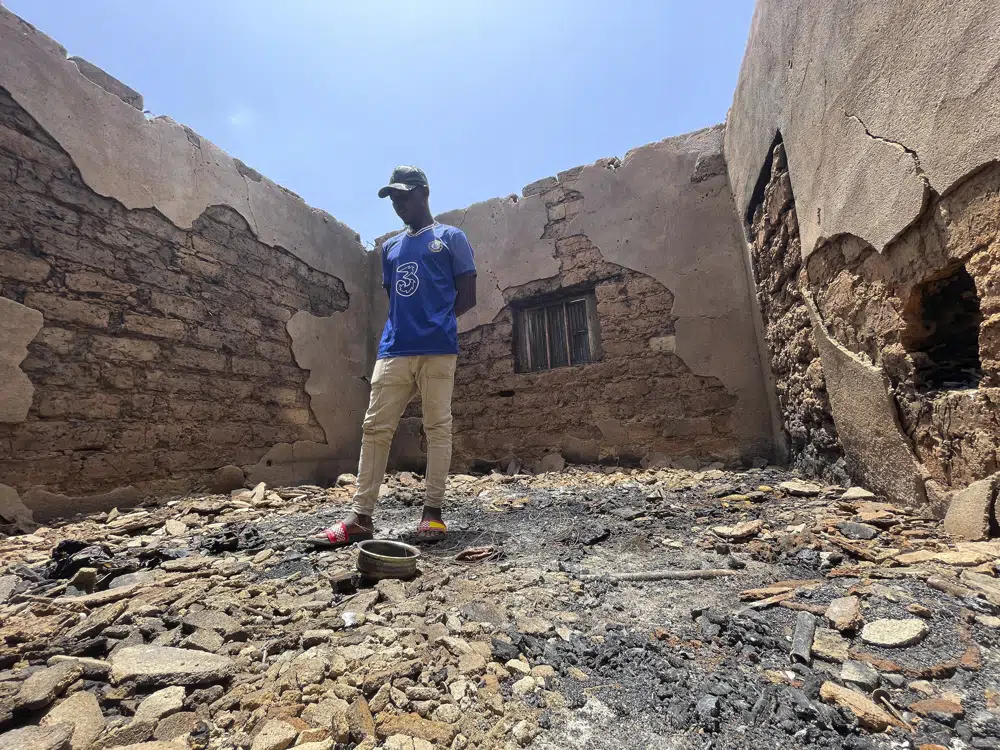The April late-night raid in Runji, Kaduna State, massacred 33 persons, the majority of whom were burned alive or shot dead. Many more people have been slain in ongoing skirmishes between nomadic cattle ranchers and farming communities in the country’s northwest and central areas, particularly over one hundred this month in Plateau state.
Per recent statistics from the Armed Conflict Location & Event data Project, the decades-long warfare has gotten more lethal, claiming at least 2,600 lives by 2021. Previously equipped with sticks, factions are now fighting with firearms, that have been sneaked into the country.

Recently, nine month old, Christian Jonathan’s mother was shot dead whiles holding her son in her arms, during a rebel invasion in their village in Northwestern Nigeria. Christian, the nine month old toddler, also suffered a finger cut-off and abandoned with bullet wound to his head, but survived.
Little Christian’s father, Joshua Jonathan narrated his child’s ordeal and said, “They left him on the ground beside his mother’s body.” “They thought the boy was dead,” Christian’s father sadly explained.
The escalating security crisis poses significant challenges for Nigeria’s incoming president, Bola Tinubu. Tinubu promised to enhance the lives of those impacted, during his campaign, and tackle the underlying causes of the problem, by providing employment and ensuring equity. Tinubu’s inaugural ceremony has been scheduled for Monday.

The conflicting factions have blamed the authorities of injustice and discrimination. However, the conflict have transitioned to a religious fold, giving birth to militias, thus either the herders, who are predominantly Muslim, or the farmers from Christian areas.
Analysts have cautioned that, if conflict doesn’t de-escalate, it would further disrupt the country and push more of its 216 million citizens into misery. According to UN organizations, conflict mostly impacts children, putting them at risk of starvation, and women, who have been always kidnapped and compelled into marriage.

Security forces’ responses have always be late, and detention of culprits are infrequent, forcing an increasing number of villages to protect and defend themselves during an ambush.
“There is a substantial loss of confidence in the government as a protector of citizens,” Nnamdi Obasi of International Crisis Group’s senior adviser for Nigeria asserted. Obasi cautioned that should the new government fail to tackle the problem quickly, it would result in “more people seeking their own self-defense, more proliferation of weapons, more criminal groups, and a rise in organized armed groups.”
Every Family Has A Scar

Moreover, victims of the village assault have been receiving medical treatments in hospitals. Others are also viewing mass graves and their burnt dwellings in Runji. They claimed, they had been under siege for several hours and that the attackers had gone before law enforcement arrived.
Christopher Dauda’s family was moving out of the village when the attackers ambushed his wife and four children, neutralizing all five. Danjuma Joshua’s two daughters were also gunned down while fleeing. Five children were set ablaze while they huddled in a room in the home of Asabe Philip, who lived but had burns all over her body.
Nine month old Christian’s aunt has attempted to step in, in the wake of his mother’s death. Christian’s father, Joshua Jonathan says his child cries a lot and sleeps very little, though his bodily injuries are steadily healing. “We try to manage with what we have left,” Joshua Jonathan said.

Herdsmen on the other side of the battle, claimed to have been assaulted as well. They accused local security forces acting as local vigilantes of cattle rustling and unlawful killings. The leader National Herders’ Association, Abdullahi Bello Bodejo, disputed that, no one in their group has to be blamed for the violence. The majority of the herders are ethic Fulanis.
“Fulanis are not the killers. Any person carrying out killings is not our member. Sometimes, when communities accuse us of killings, 75% is not true; they have their own crisis but always blame Fulanis,” Bodejo claimed.
READ ALSO:Iconic Sursock Museum Opens Again























